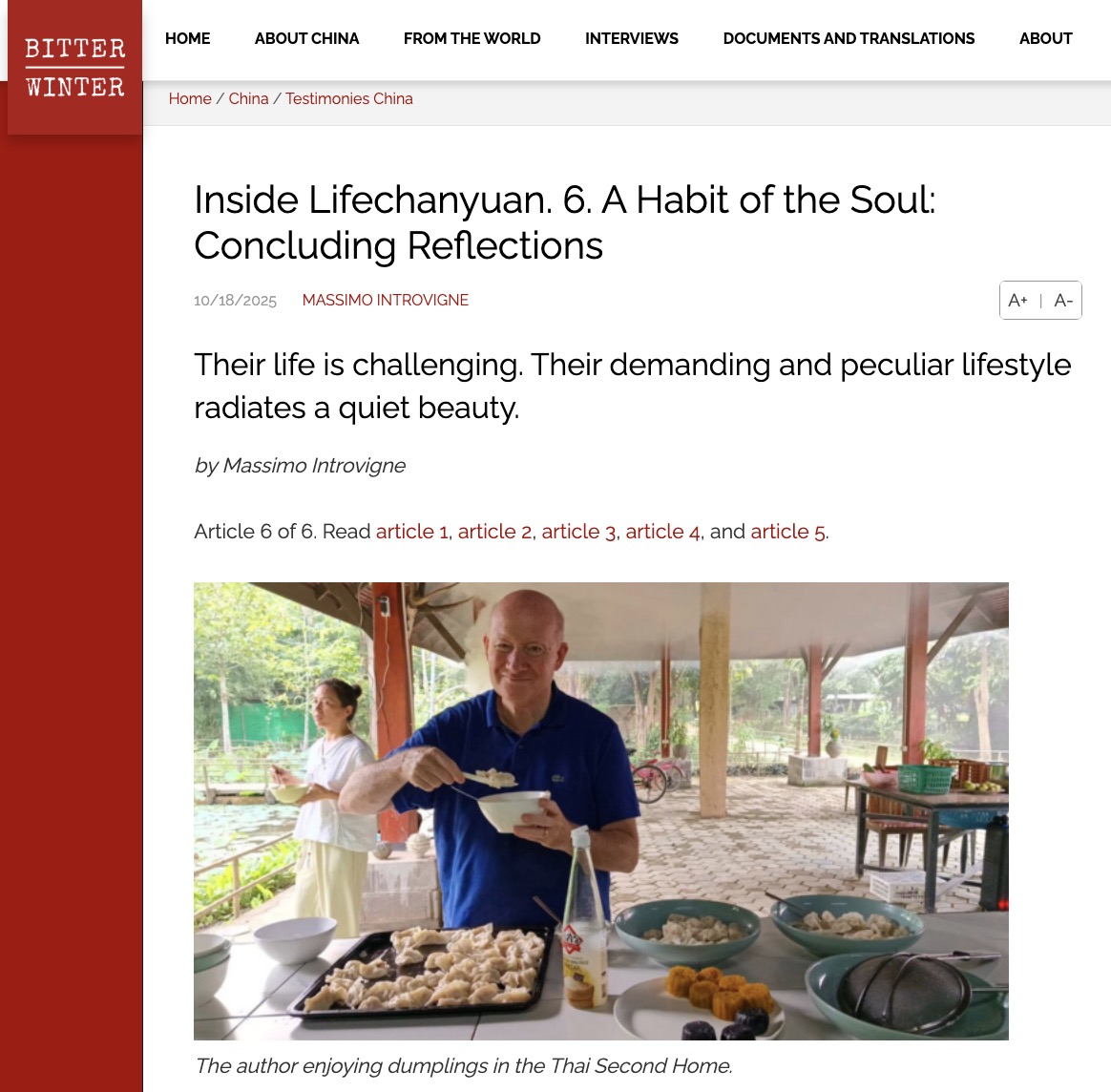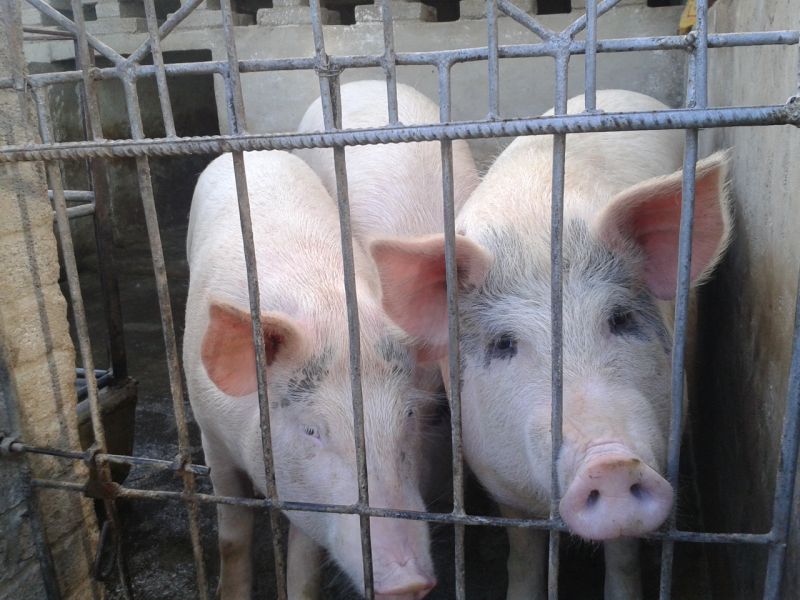|
《寒冬》编辑 Massimo 刊登第六篇:走进生命禅院:灵魂的习惯——最后的静思
亲爱的导游叔叔及各位亲人们:
感恩佛祖上帝的恩赐,感激道的安排。
第六篇——“Inside Lifechanyuan. 6. A Habit of the Soul: Concluding Reflections”——已于10月18日正式发布。本篇主要分享编者自身的思考与感悟,同时记录了部分禅院草们的经历与心路历程。


Inside Lifechanyuan. 6. A Habit of the Soul: Concluding Reflections
10/18/2025 Massimo Introvigne
Their life is challenging. Their demanding and peculiar lifestyle radiates a quiet beauty.
by Massimo Introvigne
The author enjoying dumplings in the Thai Second Home.
My interest in Lifechanyuan began not with theology or utopia but with persecution. Reports of heavy-handed raids in China—detentions, forced “deprogramming,” and surveillance—led me to investigate. During my stay at the Thai Second Home, I listened to personal accounts from four Celestials who had lived through the 2021 crackdown: three from Tongzi and one from Anlong.
They described being bound with ropes, loaded at gunpoint onto buses, and taken to hotels or police stations where they were watched around the clock. The police already knew who they were. At the stations, they were met by officers from their hometowns, who escorted them back and placed them under local surveillance. They were forbidden to leave their towns and threatened with incarceration if they maintained contact with Lifechanyuan.
Their escape stories were as harrowing as they were resourceful. One woman obtained a new passport in a city far from her own. Another was stopped at Shanghai Airport—where controls are notoriously strict—but rerouted through Macau, where she slipped through and flew to Thailand. These accounts confirm what I have heard from refugees of other banned religious groups: the objection by immigration authorities in democratic countries that banned believers can never obtain passports or cross borders in China is simply incorrect.
One Celestial, raised as a Hui Muslim, shared a particularly poignant journey. She had joined Falun Gong in hopes of healing chronic health issues—and found relief. Between 1999, when China cracked down on Falun Gong, and 2017, she was repeatedly detained and beaten. In 2017, she was sentenced to two years in jail, where she was mocked and beaten by guards who sneered sarcastically, “Look, here comes the Buddha.” After her release in 2019, she faced discrimination as an ex-convict. Cameras were installed in her home, and uniformed and plainclothes police were stationed outside her house.
The Celestial who is a former Falun Gong practitioner (on the left), with a fellow Celestial in Thailand.
A friend gave her the “800 Values” book of Lifechanyuan. She had long been puzzled by the question of why the Chinese are called the “descendants of the dragon” and never found an answer, until she found the writings of Guide Xuefeng (see article 3 in this series). She believed. She told the authorities she had left Falun Gong—which was true—but concealed her new affiliation. That was enough to secure a passport and reach Thailand. Even there, she received calls from the Chinese police. She reiterated her departure from Falun Gong, then deleted her old phone numbers.
She also discussed overcoming her religious taboo against pork. In Falun Gong, she continued to abstain. In Lifechanyuan, she viewed dietary restrictions as “religious programs” to be transcended. The community does not eat wild animals and avoids killing when possible. It is taught by Guide Xuefeng that “when an animal is being killed, its indignation and resentment will cause it to release a toxin in its meat. We will absorb the toxin when we eat the meat.” It considers refraining from eating meat as a form of compassion. However, necessity sometimes requires otherwise. “Whether one eats meat or not depends on the actual situation.”
When police threatened to confiscate their chickens in China, they killed them. They also have pigs slaughtered for meat—but not without ceremony and precautions to reduce their suffering. Members speak and “chant scriptures” to the animals, thanking them and suggesting their sacrifice may help their reincarnation into human form. “Pigs usually scream like hell,” one Celestial told me, “but ours go peacefully. It is as if they understand.”

Pigs kept by Lifechanyuan in the Yinyi Ecovillage.
The Celestials I met came from diverse backgrounds. All but one were from China; one had recently arrived from Malaysia. Some learned about Lifechanyuan through friends, but most found it online—even after the raids. The website is banned in China, but many access it via VPN. To join, one needs to study the “800 Values,” contact Guide Xuefeng, be approved, and receive a new name. Former members may have a second chance to join. A Celestial living in Thailand left the movement, tried marriage (which she described as “absolutely miserable”), reapplied, received a second Celestial name, and joined the Thai Second Home.
They have hosted around one hundred visitors, mostly New Agers. Many appreciate the community, but few express interest in joining. Contacts are maintained through the Internet and international networks of voluntary communities. A German anthropologist who visited them in China introduced them to the Italian community of Damanhur. They saw similarities—though Damanhur allows temporary marriages, renewable by mutual consent, while Lifechanyuan’s rejection of marriage and even stable one-on-one relationships is more radical.
Lifechanyuan resists labels. It does not call itself a religion, a movement, or an organization. It is, in their words, an “international family.” One Celestial offered a more poetic definition of a spiritual habitat or sanctuary: “a habit of the soul.”
They revere their teacher, Guide Xuefeng, as a unique individual. He is not worshipped. He is a messenger of the Creator God. Members believe he was announced by Boriska Kripiyanovich, a Russian boy born in 1996 who claimed to be from Mars and prophesied the arrival of a great teacher. Boriska became a New Age sensation before mysteriously disappearing (he would be 29 today, and speculations on his fate abound on the web). Guide Xuefeng claims to be the teacher Boriska foretold.
Still, the focus is not on Xuefeng. As his designated successor in Thailand told me, “Ideally, we all should connect directly with the Greatest Creator. But most people need guides. The master teaches you during the journey—but when you arrive at the destination, you are the master.”
Two Celestials from the Thai Second Home.
In my view, Lifechanyuan is as much an anarchist experiment as a communist utopia—though they do not refer to the anarchists of old. The “800 Values” invite followers to emulate “Jesus Christ, Buddha Sakyamuni, Lao Tzu, and Mother Teresa.” Some Christians have called them “Satanists,” misunderstanding their gnostic interpretation of Satan’s role. Chinese authorities see them as subversive, as they do not align with Xi Jinping’s slogans and claim their spiritual communism is superior to the CCP’s materialist version. Even their Canadian bank has become suspicious and tried to cancel their account.
Yet, they are a peaceful community. Their lifestyle is not for everyone. The Celestials told me how challenging it is, especially in the early months. The difficulty is not physical—though working the fields in a remote corner of Thailand is no small feat—the real challenge is emotional and relational: learning to merge with the group, overcoming natural antipathies, loving everyone, and practicing physical intimacy without attachment.
They love children, but only one in the Thai Second Home was born before his parents joined. The precarious legal status of the community in Thailand has discouraged childbearing, though it remains a personal choice.
Some of their struggles stem from Chinese persecution, while others are common to intentional communities around the world. I have a different perspective on religion, society, and family. But it is not the scholar’s job to judge—only to observe and understand.
And I did understand. In my days among the Celestials, I saw a demanding, peculiar lifestyle that radiates a quiet beauty. They live with purpose. They smile with conviction. Their happiness is infectious.
My journey to study this unique community continues.
Link: https://bitterwinter.org/inside- ... luding-reflections/
中文翻译:
走进生命禅院·第六篇:灵魂的习惯——最后的静思
2025年10月18日 马西莫·英特罗维涅
他们的生活虽满是挑战,却在严格而独特的节奏中,散发出一种静谧的美。
我对生命禅院的兴趣,并非源自神学的好奇,也非乌托邦的幻想,而是从迫害的阴影开始。关于中国严厉突袭的报道——拘押、强制“洗脑”、无处不在的监控——促使我开始探寻真相。在我驻留生命禅院第二家园泰国分院期间,我聆听了四位禅院草们的亲身叙述,他们曾在2021年的打压中历经磨难:三位来自桐梓,一位来自安龙。
他们讲述了自己被绳索束缚,在枪口的威胁下被强行带上巴士,送往酒店或警局,在那里24小时无休地被监视。警方早已掌握了他们的身份。在警局里,他们由家乡的警察接待,这些熟悉的面孔随后将他们护送回家乡,置于当地严密的监控之下。他们被禁止离开自己的城镇,若仍与生命禅院保持联系,监禁的阴影便随之而来。
她们的逃亡故事既惊心动魄,又充满机智与勇气。远离家乡的城市,一位女性成功办到了新护照;另一位在上海机场被拦下——那个严格的安检关口——却巧妙绕过,借道澳门,最终顺利飞往泰国。这些经历印证了我从其他被禁止宗教团体难民口中听到的情况:一些民主国家移民当局宣称,在中国被禁止的信徒无法取得护照或跨境,这种说法完全偏离事实。
一位禅院草,成长于回族穆斯林家庭,分享了她尤为动人的经历。她曾加入法轮功,寻求治愈长期困扰的健康问题——也确实获得了缓解。自1999年中国打压法轮功以来,她屡次被拘留与殴打。2017年,她被判两年监禁,在狱中遭受狱警冷嘲热讽与拳脚相加——狱警冷笑着说:“看啊,佛来了。”2019年获释后,她作为前罪犯遭受歧视,家中安装了监控摄像头,门外则常有便衣与制服警察守候。
一位朋友送给她一本生命禅院的著作——《新时代人类八百理念》。长期以来,她一直困惑:“为何中国人被称作‘龙的传人’?”这个谜题直到她读到雪峰导游的著作(参见本系列文章第3篇)才有了光亮。于是,她开始信仰生命禅院。面对当局,她坦言已脱离法轮功——这确实属实——却未透露自己新的信仰。仅凭此,她顺利取得护照,踏上前往泰国的旅程。即便远在异国,她仍接到来自中国警方的电话。她再次强调自己已脱离法轮功,随后删除了旧电话号码,像斩断一条看不见的锁链。
她还谈到如何克服对猪肉的宗教禁忌。在法轮功时期,她严格忌食猪肉;而在生命禅院,她将饮食禁忌视作一种“宗教规程”,认为应当超越个人执念。生命禅院社群不食野生动物,尽力避免杀生。雪峰导游教导说:“当动物被杀,其愤怒与怨恨会渗入肉中,若食之,便吸收其毒。”因此,戒食肉被视为一种慈悲的实践。然而,有时出于现实需要,也可破例——“吃与不吃,要随缘而行。”
当警方威胁要没收他们在中国饲养的鸡时,他们选择自己宰掉这些鸡。他们也会宰猪作食用,但绝不随意,而是在仪式与各种细致的措施下,尽量减少动物的痛苦。成员们会与动物交谈、诵经,感谢它们的付出,并暗示其牺牲可能助其转世为人。一位禅院草告诉我:“猪通常会尖叫得很厉害,但我们的猪很安静,仿佛它们能理解这一切似的。”
我遇到的禅院草们来自各自不同的背景。除了有一位来自马来西亚,其余皆来自中国。有些人是通过朋友结识生命禅院的,但更多的人是在网上找到的——即便在突袭之后。网站在中国被封锁,仍有许多人通过VPN悄然访问。加入的流程包括学习《新时代人类八百理念》,联系雪峰导游,获得批准,并领取一个新的禅院草名。前成员亦有重归之机。一位居住在泰国的禅院草曾离开团体,尝试婚姻——她形容那段经历“绝对痛苦”——随后重新申请,获得第二个禅院草名,回到了泰国的第二家园。
他们曾接待过大约一百名访客,多数来自新纪元运动。许多人为这个社群的氛围所吸引,却鲜有人表示想要加入。联系主要通过互联网以及国际志愿社群网络维系。一位曾造访中国分院的德国人类学家,将他们介绍给意大利的达曼胡尔社群。两者之间存在些许相似之处——达曼胡尔允许临时婚姻,并可经双方同意延续,而生命禅院对婚姻乃至稳定的一对一关系的拒绝,则更为彻底与激进。
生命禅院抗拒一切标签,它不称自己为宗教、运动或组织。用他们的话来说,它是一个“国际大家庭”。而一位禅院草则给出了更具诗意的诠释,将其视作灵魂的栖息地与避风港——一个属于心灵的安宁所在,一种“灵魂的习惯”。
他们尊敬自己的导师——雪峰导游——视他为独一无二的人。并非出于盲目的崇拜,而是相信他是佛祖上帝的使者。成员们深信,他的到来早已被预言——由波力斯卡·克里皮亚诺维奇(Boriska Kripiyanovich)所启示。波力斯卡,这位1996年出生的俄罗斯男孩,自称来自火星,曾预言过一位伟大导师的降临。他在新纪元圈子里一度引起轰动,随后神秘消失——今年他本应29岁,网络上关于他的下落充满无数猜测。而雪峰导游则宣称,自己正是波力斯卡所预言的那位导师。
然而,焦点并不在雪峰本人。正如他在泰国的指定继任者对我所说:“理想之境,我们应直接与佛祖上帝相连。但大多数人仍需要导师。导师在旅途中引导你、启迪你——而当你抵达彼岸时,你便成为自己的导师。”
在我看来,生命禅院既像一场无政府主义的实验,也隐隐呈现共产主义乌托邦的影子——尽管他们从不提及旧时的无政府主义者。《新时代人类八百理念》鼓励追随者效仿“耶稣基督、释迦牟尼佛、老子与特蕾莎修女”。一些基督徒曾将他们误解为“撒旦教徒”,未能理解他们对撒旦角色的诺斯替主义阐释。中国当局则视他们为颠覆性组织,因为他们不随习近平的口号起舞,并声称其精神上的共产主义超越中共的唯物主义版本。甚至在加拿大,他们的银行账户也遭遇质疑,试图被关闭。
然而,他们是一个和平的社群。他们的生活方式并不适合所有人。禅院草们告诉我,这种生活尤其在最初几个月非常艰难。困难并不在于体力——尽管在泰国偏远地区劳作并非易事——真正的考验在情感与人际之间:学会与群体融为一体,超越自我的执着与偏见,去爱每一个人,并在无执着中体验身心的契合。每一天,都是对心灵的温柔训练,也是对自我的深刻觉察。
他们心怀对孩子的爱意,但在泰国的第二家园里,唯一的孩子是在父母加入之前出生的。由于社群在泰国的法律地位尚不稳固,这在某种程度上抑制了生育的可能。然而,生育依然是一种个人的选择,一如心灵深处的自由意愿。
他们所面临的困难,一部分源自中国的迫害,另一部分则是全球意向性社群普遍面临的挑战。我对宗教、社会与家庭怀有各自的理解与看法。然而,学者的职责并非评判,而是静静地观察,去理解其中的脉络与深意。
而我确实理解了。在与禅院草们共度的日子里,我看见了他们那种严格而独特的生活方式,仿佛自内而外散发着宁静的光。他们的日常在信念中悄然流动,每一个微笑都饱含坚定与温柔,他们的幸福如涟漪般,轻轻感染着周围的一切。
我对这个独特社群的观察与思考,旅程仍在继续,如水般流淌。
|